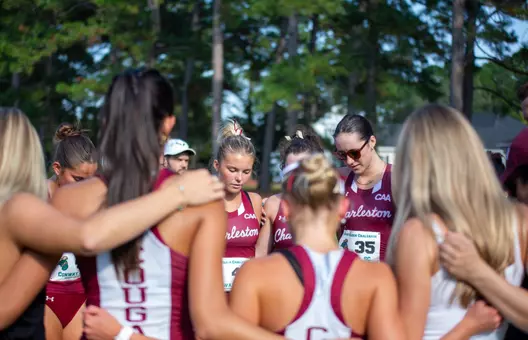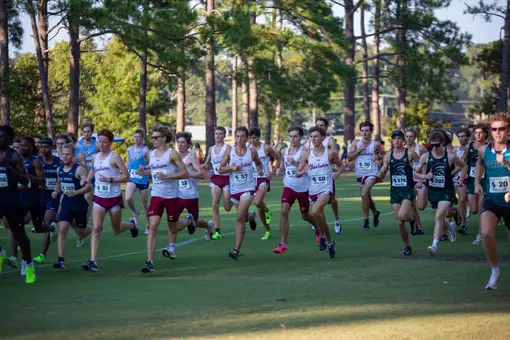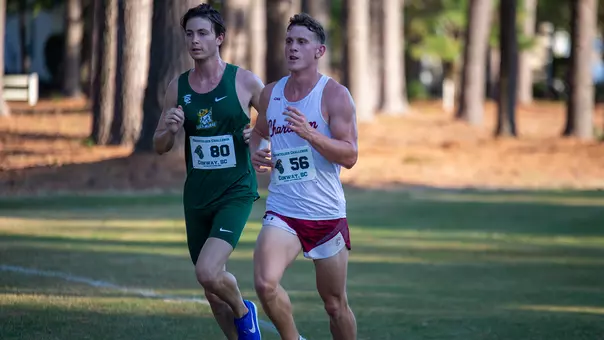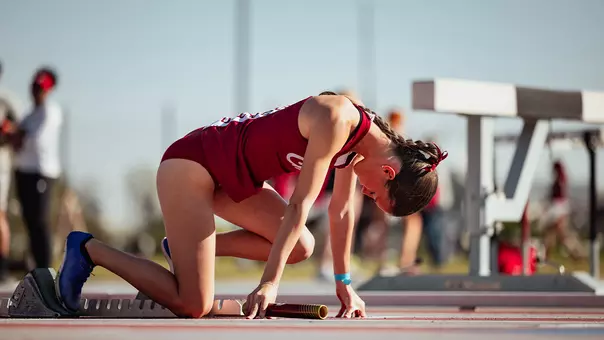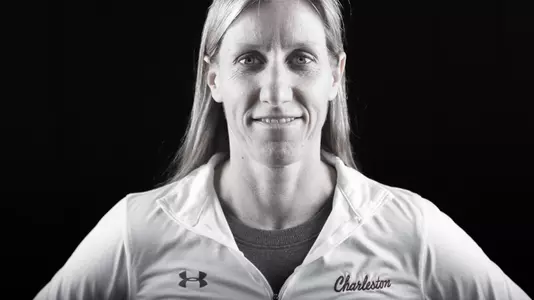
College of Charleston Athletics Year of Women Coach Series: Amy Seago
2/5/2019 12:00:00 PM | General, Men's Cross Country, Women's Cross Country, Women's Track & Field
Photo Credit: Marquise Pointer / Athletics Communications Student Intern
NICK VLATTAS
CofCSports.com
College of Charleston head cross country and track & field coach Amy Seago is the longest-tenured female head coach at the College of Charleston, and among the longest-tenured coaches at The College overall.
With 16 years at the helm under her belt, Seago's Cougars have amassed 22 conference individual titles and earned eight NCAA Regional appearances. CofC's record books have been almost entirely rewritten by student-athletes under her tutelage and her programs continue to build upon that success and garner respect.
But for Seago, her pride isn't born from developing better runners, throwers and jumpers; it comes from developing better human beings who are more prepared to leave an indelible mark on the world, well beyond their time at The College.
Seago was drawn to the sports realm at an early age by two dominant speed skaters with very different stories—Bonnie Blair and Dan Jansen. While both would eventually achieve Olympic Gold, their paths there—and the reasons they earned Seago's respect and admiration—vary greatly.
Seago recalls witnessing Blair explode into the global spotlight by capturing the Gold medal in her very first Olympic event at the 1988 Winter Olympics in Calgary, Alberta. Then, at the 1992 Winter Olympics in Albertville, France, Blair captured two more Gold medals, and repeated that performance once more at the 1994 Winter Olympics in Lillehammer, Norway. By the time she was finished, Blair was the first American woman to win five Gold medals, and at the time was the only American to hold six medals from any Winter Olympics.
 Seago recalls her fascination with Blair's commitment to perfection, and her ability to rise to the occasion every time she was on her sport's biggest stage.
Seago recalls her fascination with Blair's commitment to perfection, and her ability to rise to the occasion every time she was on her sport's biggest stage.
Meanwhile, Blair's American counterpart on the men's side of the sport, Jansen, was dominating World Sprint Championship events and littering his name across the sport's record books. However, despite being favored to win Gold virtually every time he competed, glory eluded Jansen on the Olympic stage. Despite his talent, his journey was beset by several obstacles including the passing of his sister on the morning of his race for the 1988 Winter Olympics. Finally, at the same 1994 Games, which served as Blair's final coronation, Jansen championed the very last Olympic race of his career, claiming his first Gold medal 10 years—and four different Olympics—after his Olympic debut.
The duality of these athletes' journeys to success illuminated an important lesson for Seago: in life—just like in running—there are multiple ways to reach a goal, and no two runs are the same.
As a self-admitted undersized kid, her running journey began when her Uncle John shared his passion for running and brought her under his wing. Seago chides that several runners will admit their running careers began when they were cut from other sports, and she recalls clinging on to a basketball, while her larger teammates passed her body around.
Not long after, she was enrolled in a track & field program at her elementary school, and quickly realized that running for sport allowed her to master her own destiny, eliminated her reliance on teammates and negated her size disadvantage. Not only that: she thrived at it.
Aided by her Uncle John—who plotted and measured her first running course around her neighborhood—Seago learned all the ins and outs of competitive running: how to breathe, how to prepare, how to sleep and how to eat.
Seago joined her middle school track program in the sixth grade and can still recall turning heads with a 6:28 mile at the first day of tryouts. She won several races early on and quickly learned that her success was addictive. Winning compelled her to train harder.
Seago continued to develop competitively all the way through her All-American running career at Allegheny (Penn.) College, where she served as a two-year team captain, appeared at the NCAA Division III Cross Country Championships twice, was a six-time NCAA qualifier in track & field, and set the North Coast Athletic Conference (NCAC) record in the 800 meters. All in all, Seago racked up 11 NCAC titles.
 Because of her dedication, determination and drive to help others succeed, Seago stood out on her teams and developed strong relationships with all of her coaches, who encouraged her to pursue a career in coaching herself.
Because of her dedication, determination and drive to help others succeed, Seago stood out on her teams and developed strong relationships with all of her coaches, who encouraged her to pursue a career in coaching herself.
She was given the opportunity to do so at Pittsburg State (Kan.), where she accepted a graduate assistant position. In that capacity, Seago began coaching a steeplechase athlete, Jeanette Mott, just as steeplechase was introduced to the women's side of the sport.
Seago taught Mott the basics of steeplechase and worked on hurdle drills, just as Seago was teaching herself the same lessons in-between sessions. After a particularly trying session, Seago recalls Mott telling her she couldn't do it. Seago sought advice from Head Coach Russ Jewett, who reminded Seago, "She can't – yet. It's your job to get her over that hurdle."
With encouragement and renewed confidence, Seago saw Mott shave 40 seconds from her first race to her second and quickly realized the ceiling for success was what they decided it was. After the two trained alongside each other for a year, Mott finished as the national runner-up in the steeplechase at the 2001 NCAA Division II Outdoor National Championships. The following year, she captured the NCAA Division II national championship title in the women's steeplechase as a senior, less than two years removed from being introduced to it.
That experience remains one of the most rewarding in Seago's career, as it revealed to her that proper mindset and self-confidence are the keys to success – and, the role of helping others improve themselves was even more gratifying than seeing seconds shaved off her own race times.
Even more fulfilling than improving student-athletes' running times, however, was Seago's realization that she could help her student-athletes become better people, not just better runners. Through her journey, Seago has come to understand that running is a metaphor for life and it contains many valuable lessons for traversing it.
Just as it manifested itself differently in the careers of Blair and Jansen, adversity presents itself in a multitude of ways, and at unpredictable intervals over the course of a long run.
Likewise, there are many methods and levels of preparation to take prior to a run, and one's ability to overcome adversity and achieve success is dictated by the level of detail in preparation. Success is in the details.
It's also easy to feel as if running times aren't dropping and there isn't any room for improvement, but it's important to recognize the process, learn something that makes you better and get closer to that goal. Every run isn't going to be a personal record and every life experience isn't going to come with a mountaintop view.
With those parallels in mind, the "track" her College of Charleston student-athletes are on is built on these cornerstones: Character, Optimism, Fortitude, Communication – Building Excellence and Success Together (creating the acronym COFC – BEST).
And while records will continue to fall, and championship accolades will continue to climb, Seago has dedicated her program to "Creating Champions for Life" and equipping student-athletes to help themselves—and others—grow beyond their time as student-athletes.
For her, that's what counts in the long run.
Editor's Note: The College of Charleston is celebrating the 2018-19 academic year as the "Year of Women." Throughout the year, CofC will host a series of events, speakers, seminars, and more to commemorate this anniversary. The events are designed to encourage dialogue about the admission and history of women students at The College, and to highlight their many contributions over the last 100 years. In conjunction, College of Charleston Athletics will profile its four female head coaches: Candice M. Jackson (women's basketball), Amy Seago (women's track and field/cross country), Natasha V. McCarthy (equestrian) and Linda Kalafatis (softball). This four-part series will chronicle the triumphs they've earned and the obstacles they've overcome, and provide a glimpse into how they continue to enable young women and shape the career paths of their student-athletes, on-and-off the fields and courts.
NICK VLATTAS
CofCSports.com
College of Charleston head cross country and track & field coach Amy Seago is the longest-tenured female head coach at the College of Charleston, and among the longest-tenured coaches at The College overall.
With 16 years at the helm under her belt, Seago's Cougars have amassed 22 conference individual titles and earned eight NCAA Regional appearances. CofC's record books have been almost entirely rewritten by student-athletes under her tutelage and her programs continue to build upon that success and garner respect.
But for Seago, her pride isn't born from developing better runners, throwers and jumpers; it comes from developing better human beings who are more prepared to leave an indelible mark on the world, well beyond their time at The College.
Seago was drawn to the sports realm at an early age by two dominant speed skaters with very different stories—Bonnie Blair and Dan Jansen. While both would eventually achieve Olympic Gold, their paths there—and the reasons they earned Seago's respect and admiration—vary greatly.
Seago recalls witnessing Blair explode into the global spotlight by capturing the Gold medal in her very first Olympic event at the 1988 Winter Olympics in Calgary, Alberta. Then, at the 1992 Winter Olympics in Albertville, France, Blair captured two more Gold medals, and repeated that performance once more at the 1994 Winter Olympics in Lillehammer, Norway. By the time she was finished, Blair was the first American woman to win five Gold medals, and at the time was the only American to hold six medals from any Winter Olympics.
 Seago recalls her fascination with Blair's commitment to perfection, and her ability to rise to the occasion every time she was on her sport's biggest stage.
Seago recalls her fascination with Blair's commitment to perfection, and her ability to rise to the occasion every time she was on her sport's biggest stage.Meanwhile, Blair's American counterpart on the men's side of the sport, Jansen, was dominating World Sprint Championship events and littering his name across the sport's record books. However, despite being favored to win Gold virtually every time he competed, glory eluded Jansen on the Olympic stage. Despite his talent, his journey was beset by several obstacles including the passing of his sister on the morning of his race for the 1988 Winter Olympics. Finally, at the same 1994 Games, which served as Blair's final coronation, Jansen championed the very last Olympic race of his career, claiming his first Gold medal 10 years—and four different Olympics—after his Olympic debut.
The duality of these athletes' journeys to success illuminated an important lesson for Seago: in life—just like in running—there are multiple ways to reach a goal, and no two runs are the same.
As a self-admitted undersized kid, her running journey began when her Uncle John shared his passion for running and brought her under his wing. Seago chides that several runners will admit their running careers began when they were cut from other sports, and she recalls clinging on to a basketball, while her larger teammates passed her body around.
Not long after, she was enrolled in a track & field program at her elementary school, and quickly realized that running for sport allowed her to master her own destiny, eliminated her reliance on teammates and negated her size disadvantage. Not only that: she thrived at it.
Aided by her Uncle John—who plotted and measured her first running course around her neighborhood—Seago learned all the ins and outs of competitive running: how to breathe, how to prepare, how to sleep and how to eat.

Seago joined her middle school track program in the sixth grade and can still recall turning heads with a 6:28 mile at the first day of tryouts. She won several races early on and quickly learned that her success was addictive. Winning compelled her to train harder.
Seago continued to develop competitively all the way through her All-American running career at Allegheny (Penn.) College, where she served as a two-year team captain, appeared at the NCAA Division III Cross Country Championships twice, was a six-time NCAA qualifier in track & field, and set the North Coast Athletic Conference (NCAC) record in the 800 meters. All in all, Seago racked up 11 NCAC titles.
 Because of her dedication, determination and drive to help others succeed, Seago stood out on her teams and developed strong relationships with all of her coaches, who encouraged her to pursue a career in coaching herself.
Because of her dedication, determination and drive to help others succeed, Seago stood out on her teams and developed strong relationships with all of her coaches, who encouraged her to pursue a career in coaching herself.She was given the opportunity to do so at Pittsburg State (Kan.), where she accepted a graduate assistant position. In that capacity, Seago began coaching a steeplechase athlete, Jeanette Mott, just as steeplechase was introduced to the women's side of the sport.
Seago taught Mott the basics of steeplechase and worked on hurdle drills, just as Seago was teaching herself the same lessons in-between sessions. After a particularly trying session, Seago recalls Mott telling her she couldn't do it. Seago sought advice from Head Coach Russ Jewett, who reminded Seago, "She can't – yet. It's your job to get her over that hurdle."
With encouragement and renewed confidence, Seago saw Mott shave 40 seconds from her first race to her second and quickly realized the ceiling for success was what they decided it was. After the two trained alongside each other for a year, Mott finished as the national runner-up in the steeplechase at the 2001 NCAA Division II Outdoor National Championships. The following year, she captured the NCAA Division II national championship title in the women's steeplechase as a senior, less than two years removed from being introduced to it.
That experience remains one of the most rewarding in Seago's career, as it revealed to her that proper mindset and self-confidence are the keys to success – and, the role of helping others improve themselves was even more gratifying than seeing seconds shaved off her own race times.
Even more fulfilling than improving student-athletes' running times, however, was Seago's realization that she could help her student-athletes become better people, not just better runners. Through her journey, Seago has come to understand that running is a metaphor for life and it contains many valuable lessons for traversing it.
Just as it manifested itself differently in the careers of Blair and Jansen, adversity presents itself in a multitude of ways, and at unpredictable intervals over the course of a long run.
Likewise, there are many methods and levels of preparation to take prior to a run, and one's ability to overcome adversity and achieve success is dictated by the level of detail in preparation. Success is in the details.
It's also easy to feel as if running times aren't dropping and there isn't any room for improvement, but it's important to recognize the process, learn something that makes you better and get closer to that goal. Every run isn't going to be a personal record and every life experience isn't going to come with a mountaintop view.

With those parallels in mind, the "track" her College of Charleston student-athletes are on is built on these cornerstones: Character, Optimism, Fortitude, Communication – Building Excellence and Success Together (creating the acronym COFC – BEST).
And while records will continue to fall, and championship accolades will continue to climb, Seago has dedicated her program to "Creating Champions for Life" and equipping student-athletes to help themselves—and others—grow beyond their time as student-athletes.
For her, that's what counts in the long run.
Editor's Note: The College of Charleston is celebrating the 2018-19 academic year as the "Year of Women." Throughout the year, CofC will host a series of events, speakers, seminars, and more to commemorate this anniversary. The events are designed to encourage dialogue about the admission and history of women students at The College, and to highlight their many contributions over the last 100 years. In conjunction, College of Charleston Athletics will profile its four female head coaches: Candice M. Jackson (women's basketball), Amy Seago (women's track and field/cross country), Natasha V. McCarthy (equestrian) and Linda Kalafatis (softball). This four-part series will chronicle the triumphs they've earned and the obstacles they've overcome, and provide a glimpse into how they continue to enable young women and shape the career paths of their student-athletes, on-and-off the fields and courts.
Charleston Men's Basketball Post Game Press Conference vs. Drake (11/17/25)
Tuesday, November 18
Charleston Men's Basketball Post Game Press Conference vs. SC State (11/14/25)
Saturday, November 15
Charleston Women's Basketball Post Game Press Conference vs. Iona (11/14/25)
Saturday, November 15
Charleston Women's Basketball Post Game Press Conference vs. Charleston Southern (11/7/25)
Friday, November 07
